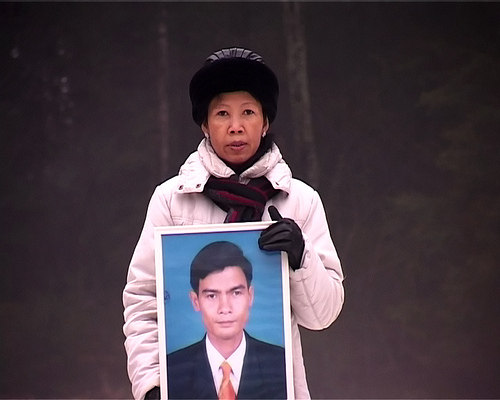
Bradley Cox’s highly controversial 2010 documentary Who Killed Chea Vichea? has been honored with a prestigious George Foster Peabody Award. Only 38 Peabodies were awarded worldwide this year. Other recipients include CNN, the BBC, HBO and the Colbert Report.
The Peabody has recognized “excellence, distinguished achievement, and meritorious public service” in electronic media for more than seventy years.
The American director’s first full-length documentary, Who Killed Chea Vichea? meticulously probes into the 2004 assassination of Chea Vichea, a revered Cambodian union leader who championed increased wages and improved working conditions for the nation’s 300,000 garment workers.
The Peabody Board praised Cox for his ability to not “let a limited budget or official resistance derail [his] investigation of the murder of a top labor leader in Cambodia, a major producer of low-cost clothing.” Thankful for the distinguished honor, producer Rich Garella insists the spotlight be taken off Cox and himself: “This recognition is not for us. It’s for the brave Cambodian people who were instrumental in making this film. The story of Chea Vichea is their story.”
In an unprecedented look at the inner workings of one of the world’s most corrupt states, Cox’s documentary reconstructs a police plot that framed two innocent men who were sentenced to 20 years each. Several of the witnesses who appear in the film have fled the country or gone into hiding for safety reasons. Cox also became persona non grata in Cambodia, eventually having to leave for his own safety. To the surprise of many in the human rights community, Cambodia’s Supreme Court provisionally released the two men on January 1st, 2009. However the men have not been cleared and prosecutors have not reopened an investigation to find the actual killers.
After its 2010 premiere at the Cannes Independent Film Festival, Who Killed Chea Vichea made headlines when the Cambodian government officially banned the documentary from the country. On May 1, 2010, in honor of International Labor Day, trade unionists attempted to hold the film’s Cambodian premiere at the very location where Vichea was murdered, but riot police raided the scene, seizing and dismantling the screens. The Cambodian government, led by Prime Minister Hun Sen, immediately declared the film an illegal import and announced that it intended to prevent any screenings “wherever they are held.” The premiere’s organizers, including Chea Vichea’s brother who now leads the union, assert that the authorities themselves were behind Chea Vichea’s murder.
The Cambodian authorities maintain the right to seize any media “that is produced or imported illegally.” After the attempted screening of Who Killed Chea Vichea?, Cambodian police repeatedly tried to confiscate the film from union organizers. The authorities have denied that their decision had any connection to politics, but no other politically charged film has been banned in Cambodia since the 1980’s.
“I would encourage Cambodian government officials to practice what they preach,” said Cox. The government’s action, he added, is “the very stuff of dictatorships.”
Opposition lawmaker Mu Sochua agreed. “Now that Who Killed Chea Vichea? is recognized with the Peabody Award, the next step is to lift the ban imposed on the film by the Cambodian government.” Real progress, she added, would be “to bring to justice those who ordered the killing.”




